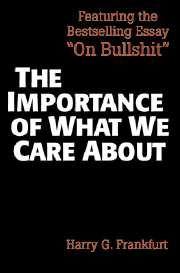Book contents
- Frontmatter
- Contents
- Preface
- Sources
- 1 Alternate possibilities and moral responsibility
- 2 Freedom of the will and the concept of a person
- 3 Coercion and moral responsibility
- 4 Three concepts of free action
- 5 Identification and externality
- 6 The problem of action
- 7 The importance of what we care about
- 8 What we are morally responsible for
- 9 Necessity and desire
- 10 On bullshit
- 11 Equality as a moral ideal
- 12 Identification and wholeheartedness
- 13 Rationality and the unthinkable
11 - Equality as a moral ideal
Published online by Cambridge University Press: 05 June 2012
- Frontmatter
- Contents
- Preface
- Sources
- 1 Alternate possibilities and moral responsibility
- 2 Freedom of the will and the concept of a person
- 3 Coercion and moral responsibility
- 4 Three concepts of free action
- 5 Identification and externality
- 6 The problem of action
- 7 The importance of what we care about
- 8 What we are morally responsible for
- 9 Necessity and desire
- 10 On bullshit
- 11 Equality as a moral ideal
- 12 Identification and wholeheartedness
- 13 Rationality and the unthinkable
Summary
First Man: “How are your children?”
Second Man: “Compared to what?”
Economic egalitarianism is, as I shall construe it, the doctrine that it is desirable for everyone to have the same amounts of income and of wealth (for short, “money”). Hardly anyone would deny that there are situations in which it makes sense to tolerate deviations from this standard. It goes without saying, after all, that preventing or correcting such deviations may involve costs which – whether measured in economic terms or in terms of non-economic considerations – are by any reasonable measure unacceptable. Nonetheless, many people believe that economic equality has considerable moral value in itself. For this reason they often urge that efforts to approach the egalitarian ideal should be accorded – with all due consideration for the possible effects of such efforts in obstructing or in conducing to the achievement of other goods – a significant priority.
In my opinion, this is a mistake. Economic equality is not as such of particular moral importance. With respect to the distribution of economic assets, what is important from the point of view of morality is not that everyone should have the same but that each should have enough. If everyone had enough, it would be of no moral consequence whether some had more than others. I shall refer to this alternative to egalitarianism – namely, that what is morally important with respect to money is for everyone to have enough – as “the doctrine of sufficiency.”
- Type
- Chapter
- Information
- The Importance of What We Care AboutPhilosophical Essays, pp. 134 - 158Publisher: Cambridge University PressPrint publication year: 1988
- 20
- Cited by



